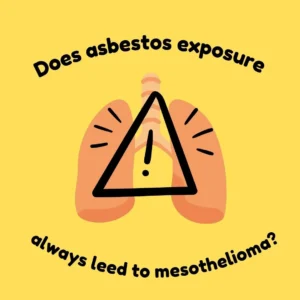Key takeaways: If you have been exposed to asbestos, you may ask yourself, “does everyone exposed to asbestos get mesothelioma?” There isn’t a way to predict whether a person exposed to asbestos will develop mesothelioma. Importantly, not all asbestos exposures lead to mesothelioma. This means that the biological and lifestyle factors that contribute to a mesothelioma diagnosis can be understood via people that do not develop mesothelioma after an asbestos exposure. These findings can inform the ways that new treatments are developed and how mesothelioma is managed.

How Does Asbestos Cause Mesothelioma?
When ingested, asbestos settles within body tissues. The body’s immune system cannot destroy, expel, or remove the asbestos fibers, so they lead to chronic inflammation, an aggravated immune response, a dampening of normal immune checkpoints, and an increased likelihood of developing mesothelioma. Asbestos is causally linked to a mesothelioma diagnosis due to the aforementioned reasons, along with other complex reasons associated with compromised immune function and genetic mutations. And, although scientists have established that asbestos causes mesothelioma, they haven’t established the exact route of carcinogenesis, or the development of the cancer. This means that we still don’t know exactly how asbestos leads to mesothelioma, although there are several hypotheses that likely hold several truths.
Importantly, it seems that the development of mesothelioma is contingent upon a myriad of factors, which is both in and out of patient control. Patients cannot necessarily control the amount or type of asbestos they’re exposed to, but they can control their diet, general fitness, and the ways in which they manage the disease. Patients can’t control genetic predispositions to mesothelioma, but they can control their nutrient and mineral intake. Because there’s a mixture of risk factors for developing mesothelioma, it’s difficult to discern what the most pressing or reversible risk factor is. For these reasons, it’s critical that doctors and scientists are able to intercept the development of mesothelioma after asbestos exposure. And, as new research surfaces about the volatility of different asbestos fibers and the ways that asbestos causes mesothelioma, the medical community will be able to dedicate more energy towards preventing mesothelioma after asbestos exposure.
What are the Chances of Developing Mesothelioma?
Any form of asbestos exposure is a risk factor for developing mesothelioma, even in negligible quantities. The Occupational Safety and Health Administration (OSHA) strongly advises employers to take precautions when there’s any risk of asbestos exposure for employees, even when exposure is technically “safe.” An asbestos exposure is legally deemed “safe” when fibers are relatively shorter and more dispersed, although any exposure poses risks. OSHA endorses the notion that any exposure to asbestos can be dangerous and should be avoided if possible.
So, Does Everyone Exposed to Asbestos Get Mesothelioma?
Not all people who have been exposed to asbestos will develop mesothelioma. In fact, the incidence of mesothelioma is relatively rare compared with less fatal asbestos-related diseases, like asbestosis. People who’ve been exposed to asbestos—but haven’t contracted mesothelioma—provide insight into different biological and lifestyle conditions that contribute to a mesothelioma diagnosis. Importantly, these findings can be used to inform new treatments and the management of mesothelioma as a chronic illness. The period between asbestos exposure and a mesothelioma diagnosis is rich with diagnostic, preventative, and treatment information to apply for future research.
If you or a loved one has been diagnosed with mesothelioma, please call The Halpern Law Firm at (800)-505-6000 or fill out our contact form. We are here to help you navigate the legal process of filing a claim to receive compensation for your cancer diagnosis. We help mesothelioma victims and their families in Pennsylvania.
Sources:
https://www.sciencedirect.com/science/article/abs/pii/S0013935123003997
https://www.cancer.org/cancer/types/malignant-mesothelioma/causes-risks-prevention/risk-factors.html
https://link.springer.com/chapter/10.1007/978-981-15-9158-7_1
https://www.ncbi.nlm.nih.gov/pmc/articles/PMC7082251/
